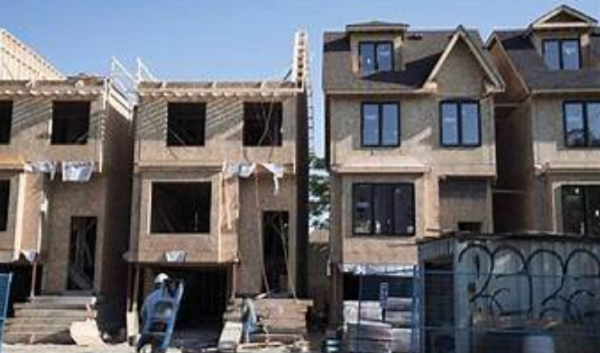Appraisal value of nearing completion property puts Toronto buyers into confusion as it is less than the preconstruction value
During the real estate frenzy in late 2020, Joe Baradziej decided to buy a $2.195-million preconstruction condo in his tree-lined neighbourhood of Leaside in midtown Toronto. He provided the developer with a deposit of $439,000, the equivalent of 20 per cent of the purchase price. His two-bedroom place with a grand view of city was on the fifth floor of an eight-floor luxury condo building.
When the building was nearing completion last fall, Mr. Baradziej got the property appraised in order to secure a mortgage. Documents viewed by The Globe and Mail show the appraisal came in at $1.6-million – 27 per cent below his purchase and sales agreement, a legally binding contract with the developer.
Lenders will only provide a mortgage based on the appraised value, so Mr. Baradziej was on the hook to bridge the $595,000 gap. He could not sell the rights to his contract, also known as an assignment sale, until the developer sold 90 per cent of all the building’s units, a common practice in the industry.
Because the condo market is in the gutter, Mr. Baradziej did not want to risk refinancing his current home to make up the shortfall. In the end, he decided to forgo his deposit.
“It comes down to simple math,” he said. ”By me walking away, I am saving money.”
According to documents viewed by The Globe, the developer, Gairloch, sent him an e-mail saying it had partnered with Royal Bank of Canada to offer a so-called blanket appraisal, which would allow buyers such as Mr. Barardziej to secure mortgages for their units by having the bank appraise the unit at the original contracted price. Mr. Baradziej declined.
“I wasn’t financially comfortable to take a mortgage out against a value I know isn’t real,” he said. “I won’t do it.”
Mr. Baradziej’s situation is an extreme example of what is taking place across the Toronto region. After a crazy period that led to record sales at lofty prices in 2021, preconstruction condo sales have dried up over the past year. As developers finish constructing buildings, properties are going underwater because buyers agreed to pay more in past years than the units are currently worth.
Appraisals are typically coming in 10 per cent to 30 per cent below a condo’s original selling price, according to appraisers, leaving scores of buyers to come up with the difference. If they can’t, they will lose their deposit and could get sued by the developer for breaking their contract.
“I haven’t seen this much of a drop in value,” said Lorenzo Presutti, an appraiser with Sharp Appraisal, who has valued properties in the Toronto region for more than two decades. His team appraised about 100 preconstruction condos in 2024.
The problem will grow this year, as developers are on track to finish constructing condo buildings totalling 30,793 units in the Toronto and Hamilton region, according to industry research firm Urbanation Inc. That will top 2024’s record of 29,800 condo unit completions.
The mismatch in value is not just occurring in the luxury segment of the preconstruction condo market. Appraisers say they are seeing it in all types of buildings.
For example, a one-bedroom 535-square foot condo in Toronto sold for $850,000 in January, 2020. The building at 55 Charles St. East was completed in 2024 and when the unit was appraised, it was valued at just $700,000, according to brokers.
Appraisers rely on comparable sales to help figure out the value. They will look at sales of condos that have already been constructed, but if the comparable examples were not built recently, then it is not an ideal measure.
Appraisers can also look at new units being sold on the assignment market, but that’s also not a perfect comparison as those can be done at fire sale prices, which are not reflective of the true market because the owner is desperate to sell.
In a market with very few sales, appraisers have to rely more on active listings, and when values are falling, appraisers have to use the lower current sales prices.
Some buyers are walking away from their purchases and losing their deposits like Mr. Baradziej. Others are relying on family to make up the difference, or on other types of financing. Many of those who have managed to bridge the gap and are renting out their units are likely burning cash every month because their mortgage payments and other condo expenses are higher than the rent they can fetch.
It all puts more downward pressure on the preconstruction market where investors are no longer interested in the product.
When Mr. Baradziej decided to buy the Leaside unit, he thought it could be an investment or his primary residence if he sold the condo he is currently living in.
His preconstruction condo was tentatively due to be ready for occupancy by September, 2022, according to documents viewed by The Globe, but the date was set back by about two years. During that period, the Bank of Canada aggressively hiked interest rates, the real estate market slowed, mortgage rates shot up and demand plummeted for preconstruction condos.
He was told he could start occupying his condo in August, 2024, while Gairloch continued to work on the building. As per industry practice, he was required to pay an occupancy fee, which includes a portion of the condo’s maintenance expenses, property taxes and the interest on the unpaid balance of the purchase price. That amounted to $13,000 per month given that Mr. Baradjiez’s purchase balance was $1.756-million.
Mr. Baradziej paid the $13,000 once, then stopped paying, defaulting on his contract and losing his $439,000 deposit.
Mike Rivait, Gairloch’s director of sales and marketing, said RBC provided all their purchasers in the building with appraisals and financing options based on their original purchase price. Mr. Rivait said RBC’s blanket appraisal program supported the purchase prices, and all purchasers had the option to arrange financing through RBC. He said no other purchaser in the building had issues with appraisal values or financing.
RBC said its appraisals are based on market conditions at a particular moment in time. “We continuously monitor market conditions and may reassess a blanket appraisal where circumstances warrant,” said Leah Robinson, RBC’s vice-president of home equity financing policy and regulatory management.
Damian Guiducci, a veteran appraiser, calls the current problems across the preconstruction housing market a byproduct of an insane period that led to record sales during the pandemic.
“Buying a preconstruction condo was such a safe thing to do,” said Mr. Guiducci, director of business development for Home Value Inc. Appraisal, whose team appraised dozens of preconstruction condos in the Toronto region last year. “Now things have hit the wall and these are the repercussions.”
This article was first reported by The Globe and Mail













